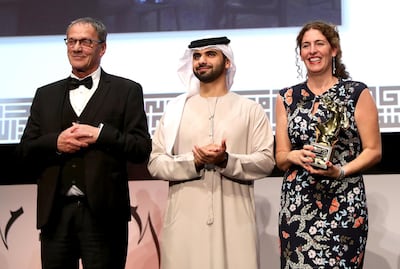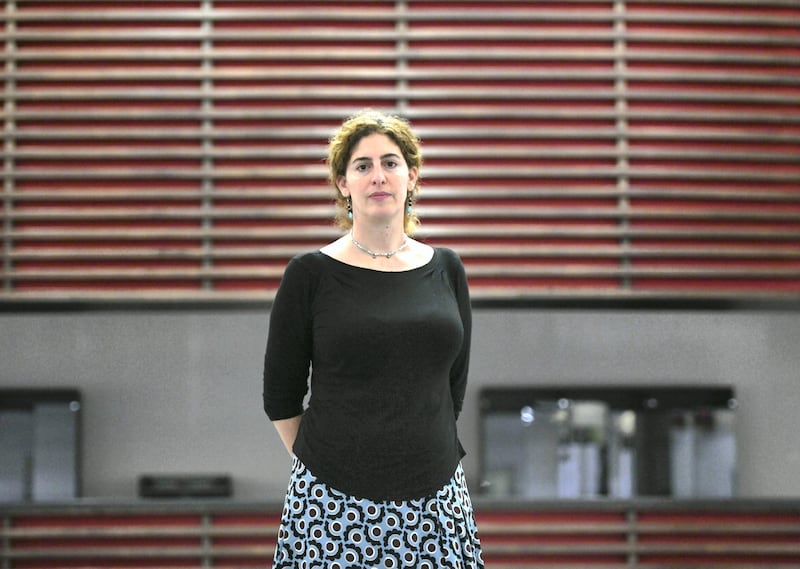Annemarie Jacir, the Palestinian filmmaker behind the highly acclaimed comedy Wajib, is working on her fourth feature film, but she doesn't know if anyone will fund it.
Jacir made waves in the international film industry earlier this year when Wajib swept the board at the Arab Cinema Centre Critics Awards, presented at the Cannes Film Festival in May.
Jacir's father-and-son road trip movie has picked up 36 awards just this year. The awards include Best Film, Best Actor for Mohammad Bakri, and Best Screenplay, adding to a list that already included Muhr Awards for Best Film and Best Actor (shared by Bakri and his real-life and on-screen son, Saleh) from last December's Dubai International Film Festival (Diff), and a Best Film gong at the Kerala International Film Festival a week later. It also won Best Film in other festivals, including Mar Del Plata, Amiens and Washington DC.
The new project
Though the details of her next project are scarce, it's said to be a drama set in Palestine, but would be partly shot in the United Kingdom. "I am in the research stage before writing a script, and that involves a lot of reading and watching and formulating," Jacir revealed in an interview at the Sorbonne University in Abu Dhabi, where one of her films was being screened.
“I hope to have some of the same [funding] partners [from old films] and new ones.”
Lack of funding and festival closures
Funding for Arab films has slowed to a trickle because of a scarcity of funds coming from Europe, where an economic crisis has limited financing for movies in general. It’s another blow for a film industry still reeling after a major supporter of regional cinema, Diff was cancelled this year for the first time since its inception in 2004. It’s set to now become a biennial event from next year. The two other major festivals, the Abu Dhabi Film Festival and the Doha Tribeca Film Festival have also been scrapped in recent years.
"When I made Salt of the Sea, I didn't get any support from the Arab world because there was not any," she says. "Film festivals like Dubai didn't exist yet, the Abu Dhabi Festival didn't exist yet, the Doha festival didn't exist."
Diff was a "real" festival that helped sculpt a lot of movies, which later made their international debut, she explains. "I don't know any other festival that was consistent and had its imprint. These things don't happen in one year, two years … it takes a long time to feel the effects of it."
For Wajib, Jacir had to glean funding from a number of random sources, including financing from France and Colombia, which came with technical strings attached over a period of five years. "You try to find support that does not come with strings attached and conditions that affect the artistic vision of the film," she says. "But I have been very lucky and have managed to avoid it. I had only technical strings attached. Those kinds of strings were OK."
To secure Colombian funding, the director had to hire a Colombian actor, so she asked her casting director to find a Palestinian with a Colombian passport to star in the movie. She found a woman living in Ramallah, who she cast in the role of the widow in Wajib.

Stifling artistic vision
The threat of funding dictating the vision of a movie could be the biggest challenge facing Arab cinema today, Jacir explains, as it competes with other international films trying to tap into the same limited pool of money. "What I do think is dangerous for the future of Arab cinema is for people behind the directors and behind the films to lose sight of what they want to say; of the story they want to tell, and that can happen sometimes because of funding," she says.
"It is happening more because of the dearth of funding," she says, as well as cinemas changing what is fashionable. Right now, companies are flocking to booths of Saudi filmmakers at festivals as the country opens up to the western world, and films are screened in the kingdom for the first time in decades.
"It is like colonialism," Jacir says. "They want to discover the great Saudi filmmaker." That leaves filmmakers in other countries off the radar of foreign producers.
Jacir believes that filmmakers from the region need to look further afield for new sources of funding. "I hope also Arab people privately become interested in cinema, not to make money, but as a cultural investment."
An Oscar-worthy director
But it’s not all bad news for the world of Arab cinema, and certainly not so for Jacir.
Each of her three feature films have been selected as Palestine's entry to the Oscars, and she has also recently become a member of the Academy of Motion Picture Arts and Sciences.
“It is a positive step for the academy, which has been known historically to be a place of white males,” she says. “A private place that women have not been a part of.”
________________
Read more:
Nadine Labaki, Annemarie Jacir and Ziad Doueiri among Academy's new intake of Oscar voters
Cannes: Annemarie Jacir's Wajib wins big at Arab Cinema Centre awards
Why a large proportion of the Arab world's best filmmakers are women
________________





